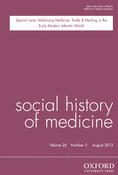-
Views
-
Cite
Cite
Wayne Hall, Dominique A. Tobbell, Pills, Power and Policy: The Struggle for Drug Reform in Cold War America and Its Consequences, Social History of Medicine, Volume 26, Issue 3, August 2013, Pages 578–579, https://doi.org/10.1093/shm/hkt019
Close - Share Icon Share
Extract
Dominique Tobbell makes a strong case for the proposition that the history of pharmaceutical regulation in the USA is essential for an understanding of contemporary policy debates in America. Big Pharma in the United States (and elsewhere) has been roundly criticised in the past decade or so for its record profit levels, the high cost of new drugs, dishonest marketing, an over-reliance on ‘me-too’ drugs that produce the same effects as old drugs at a much higher price and the suppression of evidence that drugs adversely affect consumers.
Tobbell's account of pharmaceutical policy in the 1960s and 1970s demonstrates that reformers have made the same criticisms since the 1950s, proposed many of the same remedies, and been frustrated in changing policy by alliances between big pharma, organised medicine and university researchers. US representatives of retired persons, for example, criticised industry drug pricing in 1959 in much the same terms as they did in 2009. The pharmaceutical industry defends its prices today using the same arguments: that high prices are required to recoup the substantial costs of research and development, not just for the drugs that get to market but for the many more that do not, and for drugs made obsolescent by newer drugs before costs are recouped.




